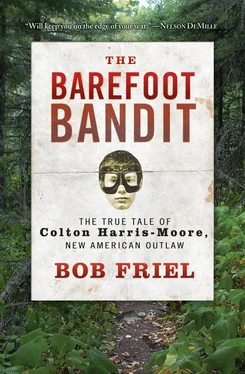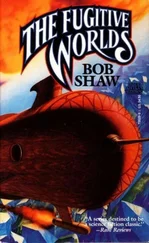Petagay found some wood burned to charcoal, but it looked more than a couple days old. We left the cave and walked through the lush seagrapes that enveloped a dune. Over the rise, the trail led to one of the island’s most beautiful reveals: a long coral-sand beach bordering baby blanket–blue water. We slipped out of our shoes and the sand felt silky cool underfoot. The light was failing rapidly as it does in the tropics once the sun sets, but I could still make out the color change that marked the Devil’s Backbone where Colt had grounded the Sea Ray. He’d misjudged the tide. There hadn’t been enough water atop the coral to get the boat across without wrecking its running gear so badly that it would eventually have to be towed all the way to Fort Lauderdale for repairs.
Like the Eluetheran Adventurers, though, Colt had managed to wade ashore. Of course the colonists didn’t have to worry about keeping their laptops and iPods out of the salt water.
We walked back inland, losing the hint of cool ocean breeze and wading back into the humidity. Mosquitoes found us and the sudden screaming trills of cicadas tore through the still air. We had the SUV as a refuge, but Colt left Preacher’s on foot. He’d presumably Google Earthed the island and knew he could follow the roads to the North Eleuthera Airport and the pockets of civilization where he could forage for food. His only other options were to stick to the coast and slog along the edge of a mangrove swamp or to try to pick his way through the backabush.
The forest here is a labyrinth of ram’s horn, thatch palm, wild dilly, granny bush, and gumbo limbo—nicknamed the “tourist tree” because its peeling bark mimics sunburned skin. Within this confusion of green, brown, and gray sprout shrubs valued by bush medicine practitioners, local alchemists who muddle and mash the leaves of explicitly named plants like “strong back” and “stiff cock” to make therapeutic potions. Radiant tiger lily blooms perch amid the dusty scrub like exotic birds, providing the only splashes of color. If Colt wanted to scout the area by climbing a tree, the tallest were leafy evergreens of the genus Metopium . Petagay’s husband, Mike, shimmied up one of these to survey their Andros property when he, too, was a Bahamas tenderfoot. They had to airlift him to a Nassau hospital. The tree’s common name—which is helpful, but not until you know how to identify it—is poisonwood, and its toxic sap can leave the unwary covered in agonizingly itchy blisters.
We climbed back in the truck. On the road, a car coming the opposite way suddenly zigzagged and then stopped in our lane, its driver hanging out the window shining a flashlight along the shoulder.
“Land crab season,” said Petagay. During the summer, these beefy crustaceans climb out of their deep burrows in the sandy forest floor and scuttle en masse to meet and mate in the sea. The next person we saw was a successful hunter pedaling his bike home with a huge crab on the handlebars. With its arms spread wide and claws held high, the crab looked like a roller-coaster rider enjoying a downhill rush. Its amusement would end with a couple days in a pen being fed coconut to purge its system and sweeten its meat before a short visit to a hot kettle.
Petagay suggested we check the area’s Haitian settlement, so we bumped along a sad excuse for a dirt road that wound through the bush. A large number of refugees have settled illegally in the Bahamas, many squatting in tin shacks or simple concrete-block homes.
A stereo balanced on the sill of a screenless window poured music into a brown grass yard where five children danced in the dusky light. They waved. Everyone we saw waved. We passed six guys carrying a refrigerator along the road, laughing and joking in Creole. We stopped to ask if they’d seen Colt, but they spoke very little English. We whittled our question down to “Tall white boy?” which got the point across, but they said no.
Next we drove to Jean’s Bay dock, where taxi boats connect North Eleuthera with the island of Spanish Wells, a white-Bahamian enclave that’s home to the best commercial lobster fishermen in the country. They don’t allow alcohol sales on Spanish Wells, so the spot where its residents step ashore on Eleuthera is dominated by a large liquor store painted like a giant Kalik label that’s visible from a mile at sea. Wooden garages line the road leading from the dock, most housing vehicles used by Spanish Wells residents during their visits to “mainland” Eleuthera. It’d be the perfect place to commandeer a car, as it might take a week or more before anyone noticed it was missing. All of the padlocks looked intact, though.
We tried calling around the island to see if anyone had heard anything new. Petagay got momentary cell service, then lost it. The islands were having more than their usual hefty share of phone and electrical issues. A pleasure boat off Briland had snagged an underwater cable with its anchor and unplugged almost all the islands’ communications for three days. Additional power grid problems also kept cutting electrical as well as cell phone service. Colt, once again, was catching some lucky breaks.
Petagay and I then drove to Three Island Dock—or as most tourists hear the Bahamian pronunciation, “Tree Island Dock.” Here, a small limestone peninsula forms a protected lagoon that’s home port for a fleet of small taxi boats that connect North Eleuthera to Harbour Island via a $5 two-mile ride. As usual, a couple of boat drivers sat on the cement seawall talking sip-sip (gossip) with the van drivers who link the dock to the rest of Eleuthera.
“Yeah, he messed with my boat Wednesday night,” said a burly driver with the sitcom name of Ricky Ricardo. “The tools he used is still in there.” Ricky said three boats had been messed with over the course of two nights. “He really tear up that Bertram there, cut up the wires, fool with the ignition, do something to the engine and the gas… The guy couldn’t run it for the whole day, had to call out a mechanic.”
The Bertram, a twenty-eight-foot classic sportfisher, had a complicated ignition that required both a key and a safety switch, which Colt wasn’t able to figure out. Ricky’s boat was a twenty-four-foot cuddy cabin set up to ferry a dozen people back and forth to Briland. None of the boats was Colt’s preferred style.
“He took one of the key switches and he try to take my batteries. I had the terminals on real tight and he couldn’t get them off so he tried to cut the wires. Why he try to take my battery?” Ricardo asked.
I shook my head. Unlike the Abacos, where there are as many boats as cars, Eleuthera has only a couple of marinas and they both lay south, miles away. There were boats around the north end that fit Colt’s predilection for speed and style, but they were across the bay at Harbour Island. He’d need a boat just to get over to the better selection. That explained the attempts on the taxi boats. Why, though, try to take a battery?
Ricky Ricardo said he’d actually seen Colton on Wednesday night. “He was walking to the dock, tall guy, short brown hair, no shoes—and that’s what I noticed because I only ever know two white guys who walk on the road barefoot.”
Ricardo said other boat drivers had also seen the Bandit. “He was sea bathing in the evening, floating in the cove around the corner… just seem like a young man, just a tourist.” They took notice because the cove is lined with ironshore—limestone bank eroded into chisel-sharp points easily capable of slicing through skin. Only the toughest leather-bottomed bare feet could make it across even a short patch of ironshore without being shredded.
The police eventually showed up with a flyer featuring Colt’s picture, and the boat drivers ID’d him.
Читать дальше












